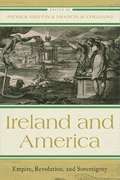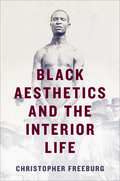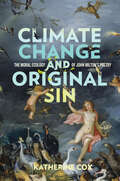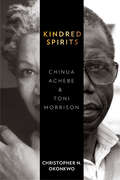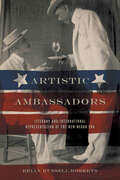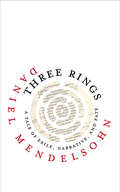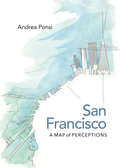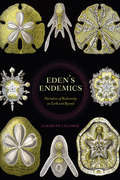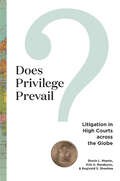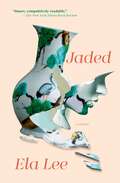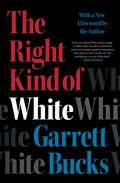- Table View
- List View
Ireland and America: Empire, Revolution, and Sovereignty (The Revolutionary Age)
by Gordon S. Wood T. H. Breen Annette Gordon-Reed Peter S. Onuf Francis D. Cogliano Christa Dierksheide Robert G. Ingram Trevor Burnard Nicholas Canny Jessica Choppin Roney S. Max Edelson Andrew J. O’Shaughnessy Matthew P. Dziennik Eliga Gould Rachel BankeLooking at America through the Irish prism and employing a comparative approach, leading and emerging scholars of early American and Atlantic history interrogate anew the relationship between imperial reform and revolution in Ireland and America, offering fascinating insights into the imperial whole of which both places were a part. Revolution would eventually stem from the ways the Irish and Americans looked to each other to make sense of imperial crisis wrought by reform, only to ultimately create two expanding empires in the nineteenth century in which the Irish would play critical roles.Contributors Rachel Banke, Illinois Mathematics and Science Academy * T. H. Breen, University of Vermont * Trevor Burnard, University of Hull * Nicholas Canny, National University of Ireland, Galway * Christa Dierksheide, University of Virginia * Matthew P. Dziennik, United States Naval Academy * S. Max Edelson, University of Virginia * Annette Gordon-Reed, Harvard University * Eliga Gould, University of New Hampshire * Robert G. Ingram, Ohio University * Peter S. Onuf, University of Virginia * Andrew J. O’Shaughnessy, International Center for Jefferson Studies at Monticello * Jessica Choppin Roney, Temple University * Gordon S. Wood, Brown University
Black Aesthetics and the Interior Life
by Christopher FreeburgChristopher Freeburg’s Black Aesthetics and the Interior Life offers a crucial new reading of a neglected aspect of African American literature and art across the long twentieth century. Rejecting the idea that the most dehumanizing of black experiences, such as lynching or other racial violence, have completely robbed victims of their personhood, Freeburg rethinks what it means to be a person in the works of black artists. This book advances the idea that individual persons always retain the ability to withhold, express, or change their ideas, and this concept has profound implications for long-held assumptions about the relationship between black interior life and black collective political interests.Examining an array of seminal black texts—from Ida B. Wells’s antilynching pamphlets to works by Richard Wright, Nina Simone, and Toni Morrison—Freeburg demonstrates that the personhood represented by these writers unsettles rather than automatically strengthens black subjects’ relationships to political movements such as racial uplift, civil rights, and black nationalism. He shows how black artists illuminate the challenges of racial collectivity while stressing the vital stakes of individual personhood. In his challenge to current African Americanist criticism, Freeburg makes a striking contribution to our understanding of African American literature and culture.
Climate Change and Original Sin: The Moral Ecology of John Milton's Poetry (Under the Sign of Nature)
by Katherine CoxPrior to the Enlightenment era, how was the human-climate relationship conceived? Focusing on the most recent epoch in which belief in an animate environment still widely prevailed, Climate Change and Original Sin argues that an ecologically inflected moral system assumed that humanity bore responsibility for climate corruption and volatility.The environmental problem initiated by original sin is not only that humans alienated themselves from nature but also that satanic powers invaded the world and corrupted its elements—particularly the air. Milton shared with contemporaries the widespread view that storms and earthquakes represented the work of fearsome spiritual agents licensed to inflict misery on humans as penalty for sin. Katherine Cox’s work discerns in Paradise Lost an ecological fall distinct from, yet concurrent with, the human fall. In examining Milton’s evolving representations of the climate, this book also traces the gradual development of ideas about the atmosphere during the seventeenth century—a change in the intellectual climate driven by experimental activity and heralding an ecologically devastating shift in Western attitudes toward the air.
Kindred Spirits: Chinua Achebe and Toni Morrison
by Professor Christopher N. OkonkwoWinner—2022 College Language Association Book Prize Finalist—2024 African Literature Association's Best Scholarly Book Award Nigerian novelist Chinua Achebe—author of Things Fall Apart, one of the towering works of twentieth-century fiction—is considered the father of modern African literature. The equally revered Toni Morrison, author of masterworks such as Beloved and one of only four Americans to receive the Nobel Prize in Literature in the past half-century, acknowledged African literature&’s and Achebe&’s influence on her own work. Until now, however, there has been no book that focuses on and critically explores the rich connections between these two writers. In Kindred Spirits, Christopher Okonkwo offers the first comparative study of Morrison and Achebe. Surveying both writers&’ oeuvres, Okonkwo examines significant relations between Achebe&’s and Morrison&’s personal backgrounds, career histories, artistic visions, and life philosophies, finding in them striking parallels. He then pairs a trilogy of novels by each author: Achebe&’s Things Fall Apart, No Longer at Ease, and Arrow of God and Morrison&’s Beloved, Jazz, and Paradise. Okonkwo closely analyzes these two sequences—through what he theorizes as "villagism"—as century-spanning village literature that looks to the local to reveal the universal.
Artistic Ambassadors: Literary and International Representation of the New Negro Era
by Brian Russell RobertsDuring the first generation of black participation in U.S. diplomacy in the late nineteenth and early twentieth centuries, a vibrant community of African American writers and cultural figures worked as U.S. representatives abroad. Through the literary and diplomatic dossiers of figures such as Frederick Douglass, James Weldon Johnson, Archibald and Angelina Grimké, W. E. B. Du Bois, Ida Gibbs Hunt, and Richard Wright, Brian Roberts shows how the intersection of black aesthetic trends and U.S. political culture both Americanized and internationalized the trope of the New Negro. This decades-long relationship began during the days of Reconstruction, and it flourished as U.S. presidents courted and rewarded their black voting constituencies by appointing black men as consuls and ministers to such locales as Liberia, Haiti, Madagascar, and Venezuela. These appointments changed the complexion of U.S. interactions with nations and colonies of color; in turn, state-sponsored black travel gave rise to literary works that imported international representation into New Negro discourse on aesthetics, race, and African American culture.Beyond offering a narrative of the formative dialogue between black transnationalism and U.S. international diplomacy, Artistic Ambassadors also illuminates a broader literary culture that reached both black and white America as well as the black diaspora and the wider world of people of color. In light of the U.S. appointments of its first two black secretaries of state and the election of its first black president, this complex representational legacy has continued relevance to our understanding of current American internationalism.
Three Rings: A Tale of Exile, Narrative, and Fate (Page-Barbour Lectures)
by Daniel MendelsohnIn this genre-defying book, best-selling memoirist and critic Daniel Mendelsohn explores the mysterious links between the randomness of the lives we lead and the artfulness of the stories we tell.Combining memoir, biography, history, and literary criticism, Three Rings weaves together the stories of three exiled writers who turned to the classics of the past to create masterpieces of their own—works that pondered the nature of narrative itself. Erich Auerbach, the Jewish philologist who fled Hitler’s Germany and wrote his classic study of Western literature, Mimesis, in Istanbul... François Fénelon, the seventeenth-century French archbishop whose ingenious sequel to the Odyssey,The Adventures of Telemachus—a veiled critique of the Sun King and the best-selling book in Europe for one hundred years—resulted in his banishment... and the German novelist W. G. Sebald, self-exiled to England, whose distinctively meandering narratives explore Odyssean themes of displacement, nostalgia, and separation from home.Intertwined with these tales of exile and artistic crisis is an account of Mendelsohn’s struggles to write two of his own books—a family saga of the Holocaust and a memoir about reading the Odyssey with his elderly father—that are haunted by tales of oppression and wandering. As Three Rings moves to its startling conclusion, a climactic revelation about the way in which the lives of its three heroes were linked across borders, languages, and centuries forces the reader to reconsider the relationship between narrative and history, art and life.
San Francisco: A Map of Perceptions (Page-Barbour Lectures)
by Andrea PonsiSan Francisco is a city designed for artists and wanderers. From North Beach, to Chinatown, to the cold, rough surf of Ocean Beach, to Marin, both visitors and lifelong residents have endless opportunities to explore new neighborhoods, buildings, environments, and cultures just by getting in the car, hopping on a cable car, or by simply walking around the block. In San Francisco: A Map of Perceptions, the architect Andrea Ponsi unravels the multifaceted beauty of one of America’s favorite cities, introducing even those who have lived there for years to nuances often left unseen. Ponsi, a native of Florence who lived in San Francisco for many years, lyrically describes everyday life in the city, from a café in North Beach where he sits next to Lawrence Ferlinghetti, to the de Young Museum ("a solid mass, a rough but elegant body, faceted but compact") and the Academy of Sciences ("an ethereal, transparent building, lace made of glass and slender columns"), to Alcatraz ("an abandoned ship, a Flying Dutchman set adrift that bears the signs of a life of torment"), and even to the buffalo who reside in Golden Gate Park.As with his book on Florence, Ponsi here reveals a deeply personal look at what it’s like to live in and love a city. Having the unique perspective of having been both an insider and an outsider to San Francisco, he speaks to us in the way we dream an architect would, capturing the city’s diverse yet emblematic structures through delicate watercolor and line drawings, while also offering poetic descriptions of the underlying smells, sounds, and light of its many neighborhoods.A perfect balance of text and illustrations, San Francisco: A Map of Perceptions offers not only a guide for those visiting or returning to the city but also a compelling invitation for residents to revisit the utterly unique place in which they live.
Eden's Endemics: Narratives of Biodiversity on Earth and Beyond (Under the Sign of Nature)
by Elizabeth CallawayIn the past thirty years biodiversity has become one of the central organizing principles through which we understand the nonhuman environment. Its deceptively simple definition as the variation among living organisms masks its status as a hotly contested term both within the sciences and more broadly. In Eden’s Endemics, Elizabeth Callaway looks to cultural objects—novels, memoirs, databases, visualizations, and poetry— that depict many species at once to consider the question of how we narrate organisms in their multiplicity. Touching on topics ranging from seed banks to science fiction to bird-watching, Callaway argues that there is no set, generally accepted way to measure biodiversity. Westerners tend to conceptualize it according to one or more of an array of tropes rooted in colonial history such as the Lost Eden, Noah’s Ark, and Tree-of-Life imagery. These conceptualizations affect what kinds of biodiversities are prioritized for protection. While using biodiversity as a way to talk about the world aims to highlight what is most valued in nature, it can produce narratives that reinforce certain power differentials—with real-life consequences for conservation projects. Thus the choices made when portraying biodiversity impact what is visible, what is visceral, and what is unquestioned common sense about the patterns of life on Earth.
Does Privilege Prevail?: Litigation in High Courts across the Globe (Constitutionalism and Democracy)
by Stacia L Haynie Kirk A Randazzo Reginald S SheehanThe first transnational comparative study of legal party capability theory Justice is supposed to be blind. Cynics will say they know better. But what do the facts say? This groundbreaking study provides objective, data-driven answers to long-standing questions about winners and losers in courtrooms across the world. Does the party with the greater resources, such as money and influence, always prevail—and if so, why? Does Privilege Prevail? is the first book to evaluate these questions using a multi-country approach and, in doing so, assess what legal professionals and political scientists call party capability theory. Stacia Haynie, Kirk Randazzo, and Reginald Sheehan analyze over fifteen thousand litigation outcomes of the high courts of six countries—Australia, Canada, India, the Philippines, South Africa, and the United Kingdom—from 1970 to 2000. This unprecedented trove of data reveals that while the &“haves&” of society do undoubtedly enjoy certain advantages in the judicial system, a more complex explanation for legal outcomes is required than party capability theory provides—especially when it comes to assessing the role of attorneys and their legal teams or the components of the docket where judges can provide avenues for the &“have nots&” to succeed.
Jaded: A Novel
by Ela LeeA young lawyer wakes up in the morning after a work gala with no memory of how she got home the previous night and must figure out what exactly happened—and how much she&’s willing to put up with to make her way to the top of the corporate ladder—in this &“smart, compulsively readable novel&” (The New York Times).Jade isn&’t even my real name. Jade began as my Starbucks name, because all children of immigrants have a Starbucks name. Jade has become everything she ever wanted to be. A successful lawyer. A dutiful daughter. A beloved girlfriend. A loyal friend. Until Jade wakes up the morning after a work event, naked and alone, with no idea how she got home. Caught between her parents who can&’t understand, her boyfriend who feels betrayed, and her job that expects silence, the perfect world Jade has constructed starts to crumble. For fans of Queenie and I May Destroy You, Jaded is a &“raw, dark&” (Refinery29) account of consent, power, race, sexism, and identity in a broken society.
The Right Kind of White: A Memoir
by Garrett BucksA &“deeply revealing and vulnerable memoir&” (Kate Schatz, New York Times bestselling coauthor of Do the Work) that earnestly reckons with whiteness and explores how understanding one&’s own white identity can create the racial accountability needed in the national discourse.As the product of progressive parents and a liberal upbringing, Garrett Bucks prided himself on the pursuit of being a &“good white person.&” The kind of white person who treats their privilege as a responsibility and not a burden; the kind of white person who people of color see as the peak example of racial allyship; the kind of white person who other white people might model their own aspirations of being &“better&” after. But it&’s Buck&’s obsession with &“goodness&” that prevents him from building meaningful relationships, particularly those who look like him. The Right Kind of White charts Buck&’s intellectual and emotional odyssey in his pursuit of this ideal whiteness, the price of its admission, and the work he&’s doing to bridge the divide from those he once sought distance from.

